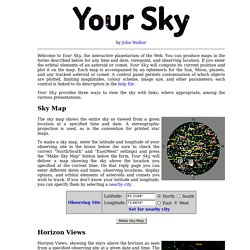

Eyes on the Solar System. Discovery News. As we approach the 164th anniversary of Neptune’s discovery, there’s another reason why we should celebrate this event in astronomical history: the gas giant is less than a year away from completing its first orbit since it was first spotted.

Although this is pretty exciting, the lead-up to Neptune’s first sighting reads like a detective novel, a testament to the ingenuity of astronomers in the 18th and 19th Centuries. ANALYSIS: Neptune’s Cold Case: Shot by a Comet 200 Years Ago? In 1781, British astronomer Sir William Herschel was the first to notice something strange about Uranus’ orbit. By 1821, French astronomer Alexis Bouvard surmised that Uranus was being perturbed by the gravity of another massive planet in the outer solar system. There had to be something out there tugging at the 7th planet from the sun. ANALYSIS: Has the Mystery of Uranus’ Tilt Been Solved? Although Neptune is oblivious of this special time in its orbit, next year will be a special year for astronomy. University of Glasgow Astronomy: News. On this page we highlight a number of recent news stories from the School of Physics and Astronomy.

Major news items are also published on the University's news pages. Please send new stories to phas-webmaster@glasgow.ac.uk Doppler shift with a twist Writing in Science Magazine, Martin Lavery and Miles Padgett of the Optics Group with collaborators Stephen Barnett and Fiona Speirits from Strathclyde have shown that the familiar change in pitch of an approaching ambulance siren can also apply to spinning objects... read more... RAE Aerospace MSc Bursary Scheme 2013 The School is pleased to announce that the Royal Academy of Engineering's Aerospace Bursary Scheme is now supporting UK and EU students who would like to study the MSc in Physics: Advanced Materials... read more... The smallest Harlem Shake in the world? Read more... Your Sky. By John Walker Welcome to Your Sky, the interactive planetarium of the Web.

You can produce maps in the forms described below for any time and date, viewpoint, and observing location. If you enter the orbital elements of an asteroid or comet, Your Sky will compute its current position and plot it on the map. Each map is accompanied by an ephemeris for the Sun, Moon, planets, and any tracked asteroid or comet. A control panel permits customisation of which objects are plotted, limiting magnitudes, colour scheme, image size, and other parameters; each control is linked to its description in the help file.
Your Sky provides three ways to view the sky with links, where appropriate, among the various presentations. Sky Map The sky map shows the entire sky as viewed from a given location at a specified time and date. Horizon Views Horizon Views, showing the stars above the horizon as seen from a specified observing site at a given date and time. The Virtual Telescope Your Sky help Related Software. Weather Forecast LA, CA. My Sky. Latitude and longitude finder. Astronomy. Astronomy is a natural science that is the study of celestial objects (such as moons, planets, stars, nebulae, and galaxies), the physics, chemistry, and evolution of such objects, and phenomena that originate outside the atmosphere of Earth, including supernovae explosions, gamma ray bursts, and cosmic background radiation.
A related but distinct subject, cosmology, is concerned with studying the universe as a whole.[1] Astronomy is one of the oldest sciences. Prehistoric cultures have left astronomical artifacts such as the Egyptian monuments and Nubian monuments, and early civilizations such as the Babylonians, Greeks, Chinese, Indians, Iranians and Maya performed methodical observations of the night sky. However, the invention of the telescope was required before astronomy was able to develop into a modern science. During the 20th century, the field of professional astronomy split into observational and theoretical branches. Etymology[edit] History[edit] Scientific revolution[edit] Los Cielos de América.